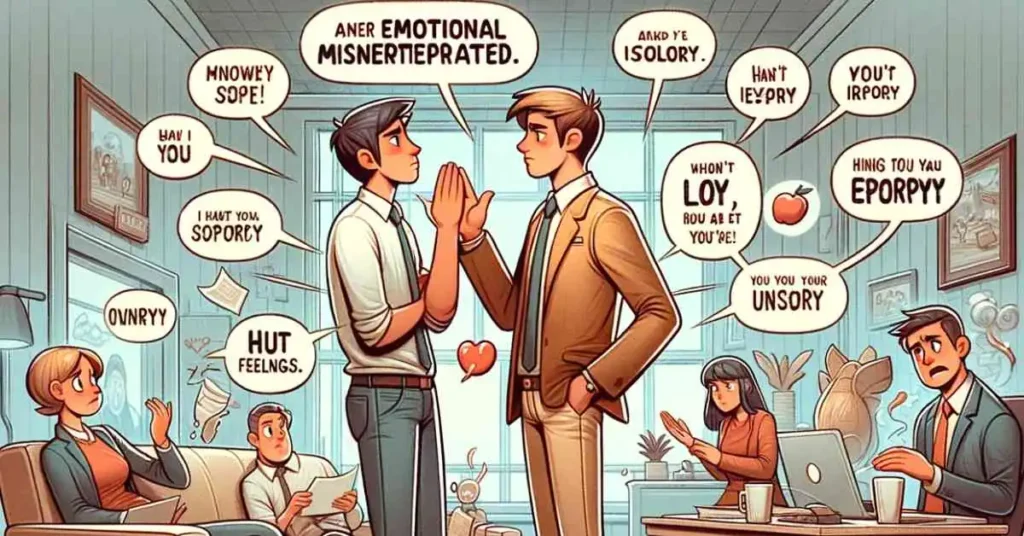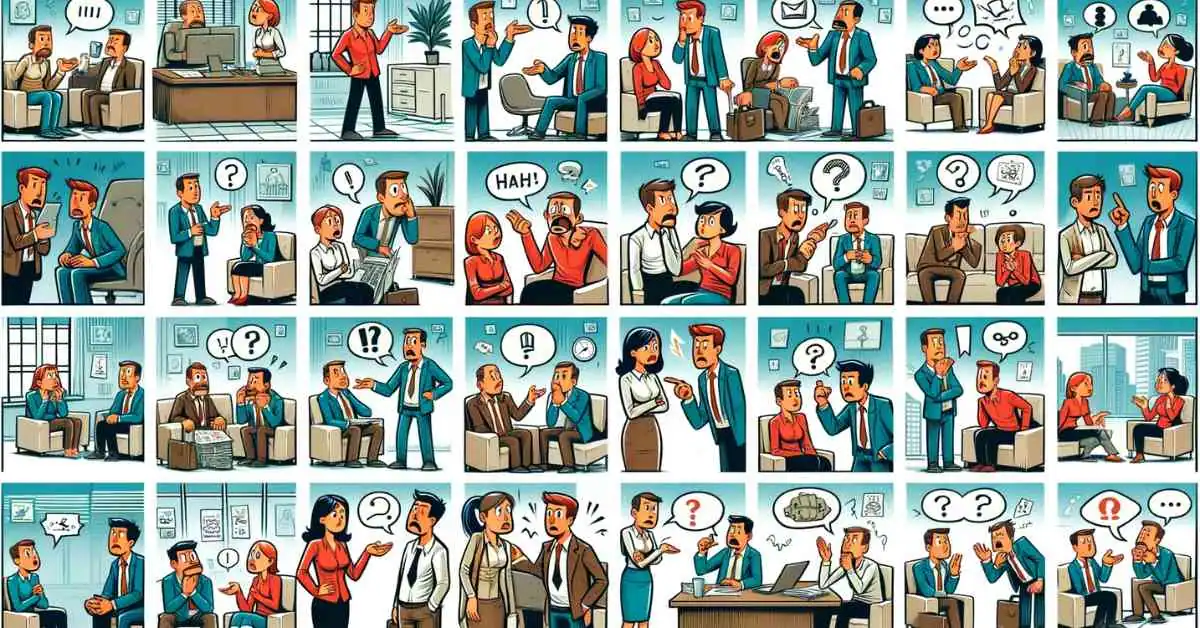Have you ever said or done something that was misunderstood, leading to a mix-up or even an argument? Misunderstandings happen to everyone. Sometimes, what we say or do doesn’t come across the way we intended. This can cause confusion or hurt feelings with friends, family, or co-workers. But these tricky moments also give us a chance to make things right. Saying sorry in a meaningful way can help fix the confusion and make our relationships stronger.
“The biggest communication problem is we do not listen to understand. We listen to reply.”
– Unknown
In this post, we’re going to share lots of different ways to say sorry for misunderstandings. We’ll cover all kinds of mix-ups, from small confusions to bigger miscommunications. These sorry messages for misunderstandings are about more than just saying “sorry” – they’re about clearing up the confusion and showing you care. Let’s learn how to use apologies to turn misunderstandings into chances for better understanding and stronger connections.
- Apologies for Misinterpreted Words and Actions
- Apologies for Assumptions and Jumping to Conclusions
- Apologies for Cultural or Language Barriers
- Apologies for Emotional Misinterpretations
- Encouraging Open and Honest Communication
- Practicing Empathy and Respecting Diverse Perspectives
- Learning from Misunderstandings and Embracing Continuous Improvement
You Might Also Like:
- SORRY MESSAGES FOR LATE DELIVERIES
- SORRY MESSAGES FOR INSULTING
- SORRY MESSAGES FOR IRRITATING
- SORRY MESSAGES FOR AN UNKNOWN PERSON
- SORRY MESSAGES FOR REPLYING LATE
- SORRY MESSAGES FOR RUDE BEHAVIOR
Apologies for Misinterpreted Words and Actions

When what we say or do gets misunderstood, it’s important to clear things up. Here are 10+ ways to say sorry for mix-ups caused by unclear communication:
“I’m sorry if my words came across the wrong way. I didn’t mean to confuse or upset you. What I intended to say was [clarify the intended message].”
“I apologize for the confusion caused by my message. It was poorly worded, and I can see how it was misinterpreted. I meant to say [clarify the intended message].”
“I regret that my instructions were ambiguous. I’m sorry for any misunderstanding this caused. My actual intention was [clarify the intended action].”
“I’m sorry if the tone of my email was misunderstood. I didn’t intend to come across as [state the misinterpreted tone]. What I wanted to convey was [clarify the intended message].”
“I apologize for any confusion caused by my recent communication. It wasn’t my intention to be unclear. I meant [clarify the intended message or action].”
“I’m sorry for the misunderstanding arising from what I said. It wasn’t my intention to cause any confusion. I wanted to express [clarify the intended message].”
“I regret that my words were taken in a way I didn’t intend. I’m sorry for any mix-up this caused. My real meaning was [clarify the intended message].”
“I apologize if my actions were misinterpreted. I understand now how they could have been seen differently, but my intention was [clarify the intended action].”
“I’m sorry for any hurt caused by my words. They didn’t come out as I planned. What I meant to say was [clarify the intended message].”
“I regret any confusion my recent remarks may have caused. I didn’t mean to be unclear. My true intention was [clarify the intended message].”
“I apologize for the mix-up caused by what I said. It was a poor choice of words, and I’m sorry for the confusion. I meant to communicate [clarify the intended message].”
In these apologies, it’s crucial to take responsibility for the miscommunication, express regret for any confusion or hurt caused, and clearly explain what you actually meant. This approach helps to clear up misunderstandings and maintain good relationships.
Apologies for Assumptions and Jumping to Conclusions

Jumping to conclusions or making assumptions can lead to misunderstandings. Here are 10+ ways to say sorry for these kinds of mix-ups:
“I apologize for jumping to conclusions without having all the information. I realize now that I should have asked for clarification. I’ll make sure to do so in the future.”
“I’m sorry for making assumptions that led to this misunderstanding. It was wrong of me not to verify the facts first, and I regret any confusion caused.”
“I regret assuming things without checking with you first. It caused unnecessary confusion, and I’m committed to seeking full clarity in the future.”
“I apologize for the misunderstanding caused by my hasty judgment. In hindsight, I should have gathered more information before reacting.”
“I’m sorry for not taking the time to understand the whole situation. My assumptions led to this mix-up, and I’ll be more thorough in the future.”
“I regret not asking for more details and jumping to conclusions. I understand the issues it caused and am dedicated to better communication moving forward.”
“I apologize for the misunderstanding my assumptions created. It was a mistake not to ask for your perspective, and I’ll ensure it doesn’t happen again.”
“I’m sorry for overlooking crucial information and making a hasty decision. It led to this confusion, and I’m working on being more thoughtful in my judgments.”
“I apologize for any confusion caused by my premature conclusions. I’ve learned the importance of getting all the facts first, and I’ll practice this in the future.”
“I regret the misunderstanding caused by my assumption. I realize now how important it is to confirm details before forming an opinion.”
“I’m sorry for not considering all aspects of the situation, leading to this misunderstanding. I’ll be more careful in the future to avoid jumping to conclusions.”
In these apologies, it’s essential to acknowledge your part in the misunderstanding, express regret for making assumptions, and commit to seeking more information before forming judgments in the future. This approach helps to clear up confusion and demonstrates your commitment to better understanding and communication.
Apologies for Cultural or Language Barriers

Misunderstandings can often arise from cultural or language differences. Here are 10+ ways to say sorry when these factors play a role:
“I apologize if my words or actions were misunderstood due to cultural differences. I did not mean to cause any offense and am eager to learn more about your culture to avoid similar misunderstandings.”
“I’m sorry for the confusion caused by our language barrier. I understand now that certain expressions can be interpreted differently, and I’ll be more mindful in the future.”
“I regret any misunderstanding that arose from my unfamiliarity with your cultural norms. I appreciate your patience and am committed to understanding and respecting your cultural perspective.”
“I apologize for misinterpreting my comments due to language differences. I’m learning and adapting to ensure clearer communication in the future.”
“I’m sorry for any offense caused by my cultural misinterpretation. It was not my intention, and I’m taking steps to educate myself better about your cultural context.”
“I apologize for the misunderstanding that resulted from my lack of familiarity with your language. I am working to improve my language skills to communicate more effectively.”
“I’m sorry if my actions were perceived incorrectly due to cultural differences. I value our relationship and am dedicated to better understanding your cultural norms.”
“I regret any confusion caused by my limited understanding of your language. I’m taking language lessons to bridge this gap and communicate more clearly.”
“I apologize for any inadvertent offense my words may have caused. I’m learning about your culture to ensure more respectful and accurate communication.”
“I’m sorry if my expressions were lost in translation. I understand the importance of clear communication and am working on overcoming language barriers.”
“I apologize for any misunderstanding caused by my cultural assumptions. I’m making an effort to be more aware of cultural differences and respect diverse perspectives.”
In these apologies, it’s key to recognize the role of cultural or language differences, express regret for any confusion or offense caused, and show your willingness to learn and adapt to different cultural contexts. This approach helps build understanding and respect in your relationships.
Apologies for Emotional Misinterpretations

Emotions, especially sarcasm, humor, or nonverbal cues, can be tricky to interpret. Here are 10+ apologies for when emotional misinterpretations lead to misunderstandings:
“I apologize if my attempt at humor was taken the wrong way. I didn’t mean to cause any hurt, and I’ll be more mindful of how my words might be interpreted in the future.”
“I’m sorry for any confusion caused by my sarcasm. I didn’t intend to offend, and I’ll work on being clearer in my communication.”
“I regret that my nonverbal cues led to a misunderstanding. I understand how this might have been misinterpreted and will be more aware of my body language from now on.”
“I apologize if my tone came across as harsh or insensitive. That wasn’t my intention, and I’ll strive to ensure my emotions are communicated more clearly.”
“I’m sorry for the misunderstanding caused by my joking manner. I see now that it wasn’t appropriate, and I’ll be more considerate in my interactions.”
“I regret that my facial expressions led to confusion. I didn’t intend to convey a negative emotion, and I’ll work on being more expressive in a positive way.”
“I apologize for any hurt caused by my words, which were meant in jest. I understand they may not have come across that way, and I’ll be more thoughtful in the future.”
“I’m sorry if my emotional response was misinterpreted. I didn’t mean to cause any distress, and I’m committed to being more careful with my expressions.”
“I regret that my playful tone wasn’t clearly understood. I apologize for any confusion this caused and will work on communicating more effectively.”
“I’m sorry if my laughter was taken the wrong way. I realize it might have been misinterpreted, and I’ll be more aware of how I express humor.”
“I apologize if my response seemed dismissive or uncaring. That wasn’t my intent, and I’ll make sure to be more empathetic and clear in my communication.”
In these apologies, acknowledging the misinterpretation of emotions, expressing regret for any resulting confusion or hurt, and emphasizing your commitment to clearer communication are crucial for repairing the misunderstanding.
Encouraging Open and Honest Communication

Open and honest communication is essential for preventing misunderstandings and building strong relationships. Here’s how to express a commitment to clear and respectful dialogue:
“I believe open, honest communication is key to avoiding misunderstandings. I’m committed to actively listening and clearly expressing myself to ensure we always understand each other.”
“I value our communication and am dedicated to keeping it open and respectful. I will make sure to clarify any ambiguous statements and seek clarification whenever necessary.”
“Open communication is crucial in our interactions. I’m committed to being transparent in my conversations with you and will always strive to listen carefully to your perspective.”
“I promise to engage in honest and open dialogue. Clear communication is important to me, and I will always seek to understand your point of view fully.”
“I’m dedicated to maintaining an open line of communication. Being clear and respectful in our discussions helps build trust and strengthens our relationship.”
“I believe in the power of honest communication. I’m committed to expressing myself clearly and listening attentively to avoid any potential misunderstandings.”
“I value our conversations and will always strive for clarity and honesty in our communication. Understanding each other is key to a strong and healthy relationship.”
“I’m committed to engaging in open and respectful dialogue. Clear and honest communication is essential, and I will always make an effort to ensure we are on the same page.”
“Open and honest communication is the foundation of our relationship. I’ll always make sure to listen actively and clarify any points that might be unclear.”
“I promise to communicate openly and seek clarity in our interactions. Honest dialogue is important to me, and I’m dedicated to fostering a trusting and understanding relationship.”
These messages emphasize the importance of open and honest communication, your commitment to active listening, and your willingness to clarify and seek clarification are key to fostering a positive and trusting relationship.
Practicing Empathy and Respecting Diverse Perspectives

Understanding others’ feelings and respecting different viewpoints is important for good communication. Here are some ways to show you’re committed to Empathy and inclusiveness:
“I believe Empathy is key in understanding each other. I’m committed to considering your perspective and feelings in our interactions.”
“I will always strive to approach our conversations with an open mind and a willingness to understand different viewpoints. Respecting our diverse perspectives strengthens our communication.”
“Understanding where you’re coming from is important to me. I’ll make sure to listen with Empathy and keep an open mind to your ideas and feelings.”
“I recognize the value of diverse viewpoints. I’m dedicated to acknowledging any biases and communicating in a way that respects all perspectives.”
“Empathy is crucial in our interactions. I promise to always try to understand your point of view and approach our discussions with respect and an open mind.”
“I believe in the importance of seeing things from different angles. I’m committed to respecting your perspective and communicating in a way that values our differences.”
“I’m dedicated to practicing Empathy in our conversations. Understanding and respecting your viewpoint is important to me for healthy and inclusive communication.”
“I promise to always consider your feelings and perspectives. Empathy and inclusiveness are important in our communication, and I’m committed to upholding these values.”
“I’m open to learning from your experiences and viewpoints. Understanding each other’s perspectives is key to our successful communication.”
“I will always try to see things from your perspective. Respecting our diverse viewpoints helps us communicate better and strengthens our relationship.”
In these messages, emphasizing Empathy, the willingness to consider different perspectives, and respecting diversity are important for open and effective communication. They show your commitment to understanding and inclusivity.
Learning from Misunderstandings and Embracing Continuous Improvement

Misunderstandings, while challenging, can be valuable learning experiences. Here’s how to convey a commitment to growing and improving from these situations:
“I see misunderstandings as opportunities to learn and grow. I’m committed to reflecting on our miscommunications to identify how we can improve our dialogue in the future.”
“Every misunderstanding teaches us something. I’m dedicated to learning from these situations and continuously improving our communication.”
“I believe in turning miscommunications into learning experiences. I’m committed to analyzing what went wrong and making positive changes in how we interact.”
“Misunderstandings can be insightful. I’m eager to use these instances as chances to enhance our communication and prevent similar issues in the future.”
“I view each miscommunication as an opportunity for improvement. I’m committed to understanding where I can improve and refining my communication skills accordingly.”
“Learning from misunderstandings is crucial. I’m focused on identifying areas where our communication can be better and am dedicated to making those improvements.”
“I embrace the lessons learned from misunderstandings. Reflecting on these moments helps me improve my approach to communication and avoid similar mistakes.”
“Miscommunications, while challenging, are opportunities for growth. I’m dedicated to continuously improving the way we share and interpret information.”
“I’m committed to learning from our misunderstandings. By examining these situations, we can find ways to communicate more clearly and effectively.”
“I see the value in learning from miscommunications. I’m focused on better conveying my thoughts and listening to yours more effectively.”
In these messages, acknowledging the potential for growth from misunderstandings and showing a commitment to continuous improvement in communication are key. It demonstrates a proactive and positive approach to building stronger, more effective communication skills.
Closing Notes

Being sincere, understanding others, and talking clearly is important to stop misunderstandings and maintain good relationships. When we mix things up, it’s best to say sorry fast and how we want to fix things. This helps build trust and sort out any trouble.
We’ve shared a bunch of ways to say sorry for misunderstandings. How we handle it matters a lot, whether it’s a little confusion or a big mix-up. We hope these sorry messages for misunderstandings help you if you ever need to clear things up. Remember, saying sorry quickly, trying to understand, and talking clearly can help us get along better with everyone.
Thanks for reading about these apologies. We hope this post helps you handle misunderstandings in a kind and clear way. Let’s all try to talk clearly, listen well, and be understanding to make our relationships stronger and happier.









